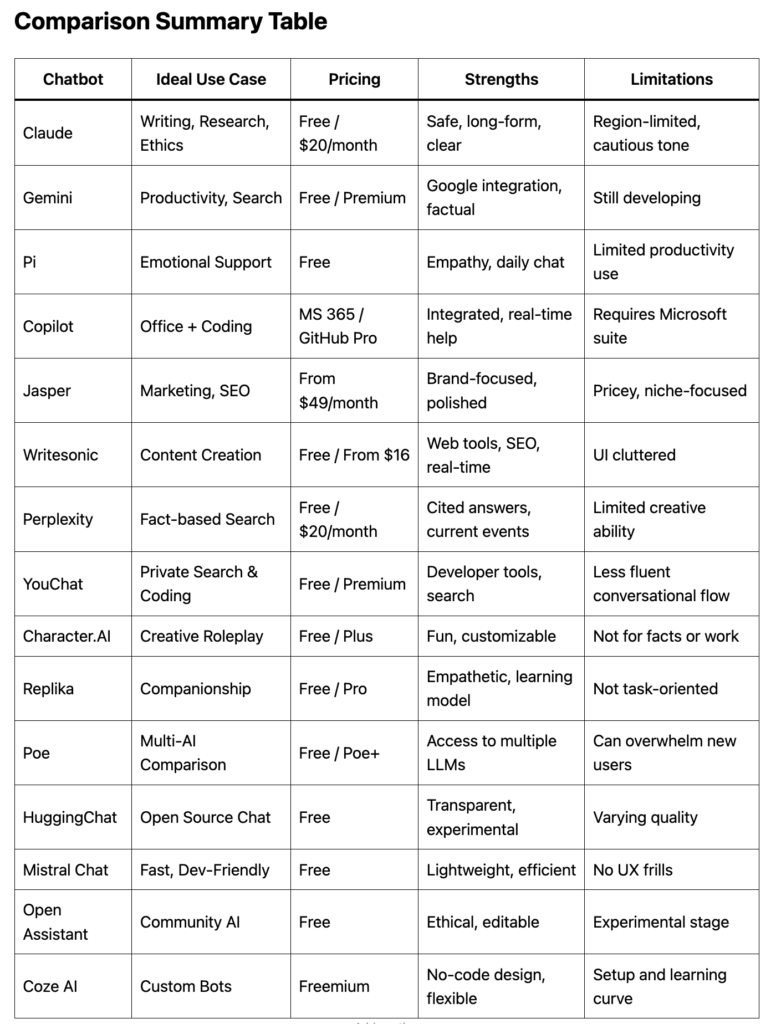- LIFE
The Cutest Girl Dog Names for Your New Pup


AI chatbots have become a cornerstone of modern digital life—powering everything from customer service and content creation to casual conversation and coding. Among them, ChatGPT by OpenAI has emerged as one of the most prominent names, widely adopted for both personal and professional use. With its powerful language capabilities and versatile integrations, ChatGPT has set a high standard.
However, 2025 is seeing a diverse ecosystem of AI chatbots rise to meet different user needs. Whether you’re a developer looking for coding assistance, a marketer generating copy, or a student seeking tutoring help, there’s likely a ChatGPT alternative tailored just for you.
Below are 15 of the best ChatGPT alternatives to try in 2025, each offering unique strengths in functionality, pricing, and usability.
Overview: Claude is Anthropic’s flagship conversational AI, known for its focus on safety, interpretability, and user alignment. Its newest version, Claude 3, is fast, articulate, and contextually aware, handling long documents and nuanced prompts with ease.
Ideal for: Professionals, researchers, enterprise-level users, safety-conscious applications
Pricing: Free tier available; Pro version (Claude Pro) at ~$20/month
Overview: Previously known as Bard, Gemini is Google’s conversational AI based on its Gemini LLMs. It integrates deeply with Google services like Gmail, Docs, and Search.
Ideal for: Students, productivity users, casual researchers
Pricing: Free for most features; Premium available via Google One
Overview: Pi is a personal AI assistant designed to be friendly, empathetic, and helpful in emotional and day-to-day support. It focuses more on conversational well-being than productivity.
Ideal for: Mental wellness, casual chatting, reflection
Pricing: Free
Overview: Microsoft Copilot integrates OpenAI’s models into Office 365, Windows, and development tools like GitHub Copilot.
Ideal for: Office users, developers, enterprise teams
Pricing: Part of Microsoft 365 subscriptions (business tier); GitHub Copilot at ~$10/month
Overview: Jasper is an AI writing assistant designed for marketers, content creators, and agencies. It specializes in tone control, SEO content, and brand-specific voice customization.
Ideal for: Marketing, blogging, social media, branded content
Pricing: Starts at $49/month
Overview: Writesonic offers a suite of tools for content writing, including blog generation, ad copy, and AI chat. It also powers ChatSonic, a ChatGPT-like chatbot with web browsing capabilities.
Ideal for: Copywriters, businesses, SEO professionals
Pricing: Free tier available; paid plans start at ~$16/month
Overview: A research-focused chatbot that gives cited, up-to-date answers, Perplexity is designed like a conversational search engine. It’s great for users who value verifiable information.
Ideal for: Researchers, students, journalists
Pricing: Free tier; Pro plan at ~$20/month
Overview: YouChat is part of the You.com ecosystem—a privacy-first AI search engine. It provides a chatbot with real-time web access and coding capabilities.
Ideal for: Web search with privacy, developers, casual users
Pricing: Free tier; Pro available
Overview: Character.AI is a unique platform where you can chat with AI personalities—from fictional characters to historical figures. It emphasizes creative role-play and custom AI companions.
Ideal for: Entertainment, storytelling, fans of fictional personas
Pricing: Free with optional Plus plan
Overview: Replika is an AI chatbot designed to be a virtual friend or companion, learning from your conversations to build an emotional bond. It’s popular for mental health support and companionship.
Ideal for: Loneliness, self-reflection, friendship
Pricing: Free basic tier; Pro at ~$15/month
Overview: Poe is a chat platform by Quora that aggregates multiple LLMs (ChatGPT, Claude, Gemini, etc.) in one place, letting users switch between them for comparative use.
Ideal for: AI enthusiasts, researchers, power users
Pricing: Free tier; Poe+ plan ~$20/month
Overview: An open-source alternative to ChatGPT, HuggingChat is built on open models like Meta’s LLaMA or Mistral. It prioritizes transparency and community-driven development.
Ideal for: Developers, open-source advocates
Pricing: Free
Overview: Mistral is a newer player offering high-performance open-source LLMs with impressive efficiency. Its chatbot interfaces are growing in popularity among tech-savvy users.
Ideal for: Developers, tinkerers, lightweight AI users
Pricing: Free
Overview: A fully open-source chatbot project aiming to democratize AI, Open Assistant emphasizes transparency, ethical development, and collaborative improvement.
Ideal for: Developers, researchers, education
Pricing: Free
Overview: Coze is a rising platform for building custom chatbots using prebuilt components and large language models. It’s aimed at startups, creators, and small businesses.
Ideal for: No-code chatbot building, startups
Pricing: Freemium with paid features
